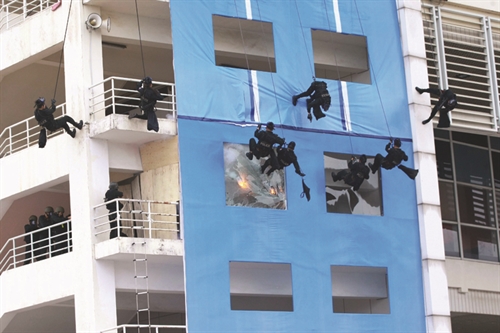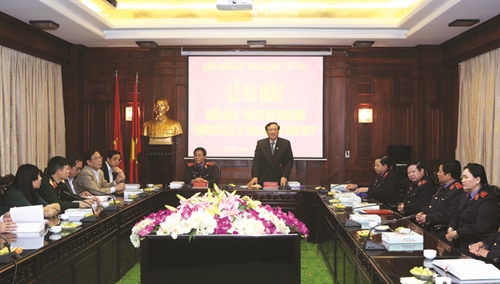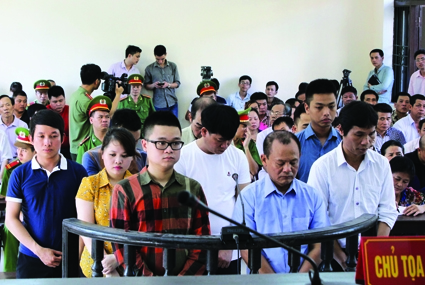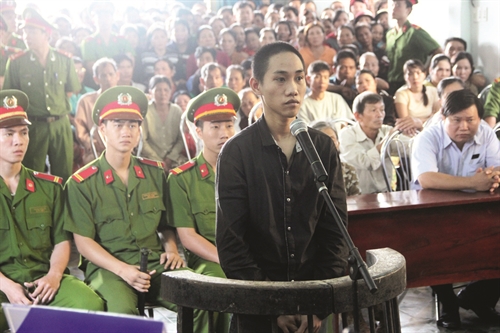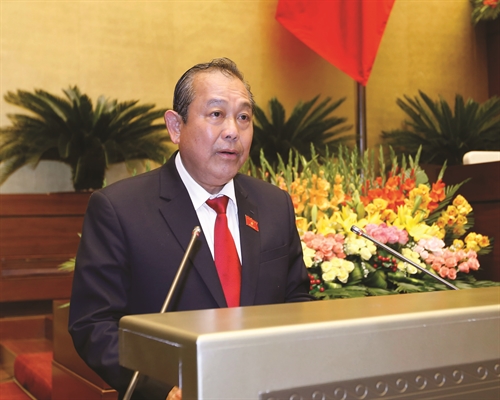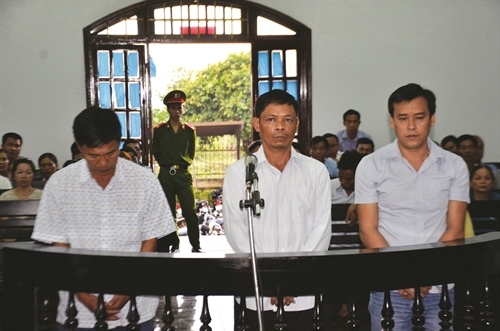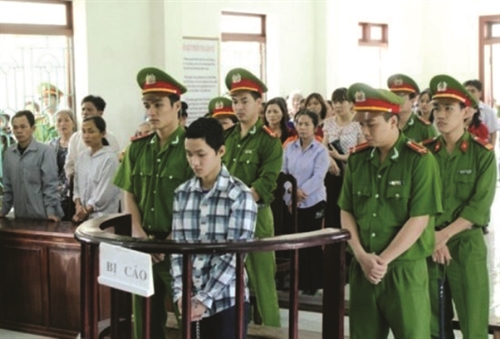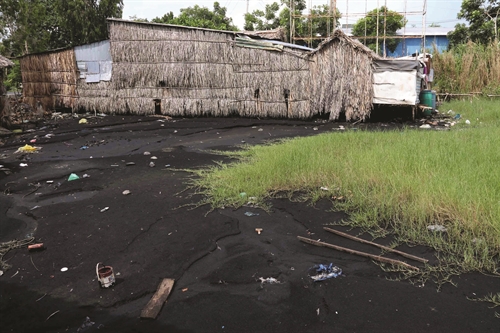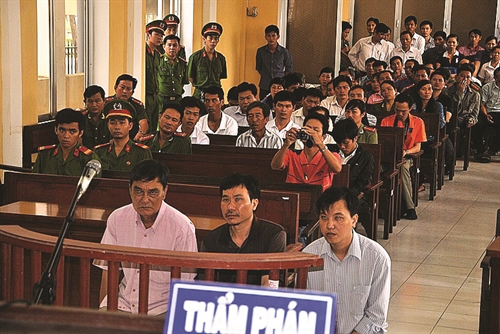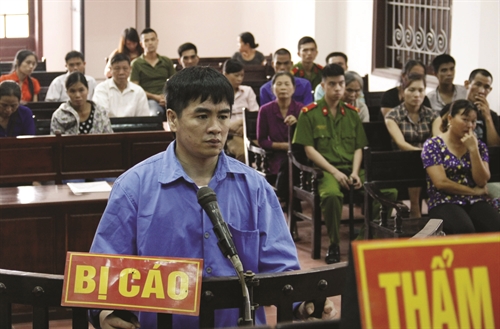This writing clarifies the content of the court’s judicial power and the requirement for institutionalizing judicial power in criminal procedure legislation. It then analyzes the new provisions of the 2015 Criminal Procedure Code regarding this issue.
Phi Thanh Chung
Hanoi People’s Court
Content of the court’s judicial power
1. The court exercises on behalf of the State judicial power to protect human and citizens’ rights and freedoms.
In criminal proceedings, investigative bodies and procuracies have competence to issue decisions to restrict human rights and citizens’ rights, particularly personal freedoms, such as decisions on arrest, temporary detention or home search. Therefore, the court, vested with judicial power, must rule on, or inspect the issuance of, such decisions in order to protect these rights.
2. The court issues decisions to resolve disputes and conflicts in order to seek the truth and achieve justice on the basis of the law and equity and such decisions are not restricted by the scope of operation of entities that conduct legal proceedings.
The court issues a judgment based on three key factors: i) objective details of the case; ii) relevant legal provisions applicable to the case; and iii) the logical way of thinking of the judge and assessor. In criminal proceedings, the court’s judgment cannot be correct if it is restricted to details (evidence) provided by the investigative body (lack of grounds) and to the scope of prosecution by the procuracy (restricted scope of issued decisions).
3. The court has competence to interpret the law (primarily legal provisions used as the basis for the settlement of a case), to develop court precedents; and to consider and announce (or just recommend) the unconstitutionality of certain laws or acts of state power branches.
4. Independent justice or judges’ and assessors’ independence in trial and abidance by the law only during the process of trial must be guaranteed.
Judicial independence is the independence of judges and assessors from: i) agencies, organizations and other persons in the power apparatus, including also leaders of the court and judges of superior courts; ii) the parties to the case; and iii) public opinion. In addition, the independence of judges and assessors also encompasses the independence among these persons themselves (independence among trial panel members and independence from themselves in the sense that they are not permitted to hear a case in which they have prejudices or related interests or relations with an involved party).
The institutionalization of judicial power, particularly the issue of judicial independence, requires the establishment of the principle of independence of the court in trial, which must address judicial independence and basic factors to ensure such independence.
5. The adversarial principle must be guaranteed.
The quality of a court’s judgment depends not only on the competence of the issuing judge but also on the amount and quality of the information provided by the parties. Even a person against whom a coercive measure is being applied is entitled to have his say in the decision-making process. This entitlement can be realized only when a democratic adversarial process is ensured in the process of trial.
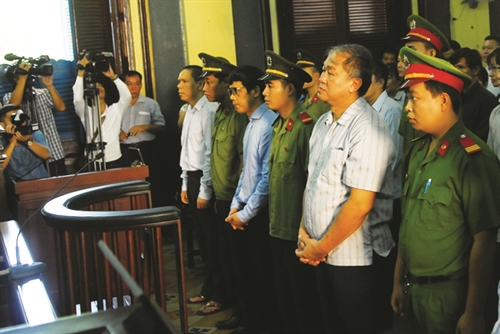 |
| Defendant Pham Cong Danh, former President of Vietnam Construction Bank and General Director of Thien Thanh Group (second from right), at the hearing to try his offense of acting against regulations on economic management and lending __Photo: Manh Linh/VNA |
The court’s judicial power under the 2015 Criminal Procedure Code
To institutionalize the spirit of the judicial reform and concretize the provisions of the 2013 Constitution, the 2014 Law on Organization of People’s Courts and the 2015 Criminal Procedure Code (the Code) contain many provisions to guarantee the exercise of judicial power by the court.
The Code affirms “judges and assessors conduct trial independently and abide only by the law” (Article 23). Under this provision, the independence of judges and assessors is guaranteed throughout the process of trial, from the preparation for a hearing to during a hearing.
It further prescribes that “agencies, organizations and individuals are prohibited from interfering in trials by judges and assessors,” and that “an agency, organization or individual that interferes in any form in a trial by a judge or an assessor shall, depending on the seriousness of its/his/her violation, be disciplined, administratively sanctioned or examined for penal liability in accordance with law.”
The Code adds another provision which says “the adversarial process in trial is guaranteed” (Article 26). This is a new principle that institutionalizes the Party’s viewpoints on judicial reform and serves as an important legal basis for renovating Vietnam’s criminal procedural model along the line of preserving and promoting the good points of the inquisitorial system and adopting progressive, suitable elements of the adversarial system.
Article 26 contains necessary and sufficient factors to ensure the adversarial principle in trial. These factors include: i) identifying the court as a central actor, a chairperson or a “referee” at a court hearing; ii) identifying the “two adversaries” in the legal proceedings; iii) affirming that the adversarial process takes place throughout the process of settlement of a case and is explicitly demonstrated at a court hearing; and (iv) affirming the equal positions of the entities participating in the proceedings in the provision and assessment of evidence, materials and objects and in the democratic process of argument at a court hearing.
Moreover, in order to ensure the adversarial principle in trial, the Code makes many provisions aiming to raise the quality of the adversarial process, such as those on the court’s duties to settle requests for provision and addition of evidence and to summons witnesses, persons conducting the proceedings and other persons to a hearing (Article 279); on the presence of procurators of the same-level procuracy (Article 289); of defense counsels (Article 291); of investigators (Article 296), of expert-witnesses and valuators (Article 294), and of interpreters and translators (Article 295); and on the adversarial procedures at a hearing (Section V of Chapter XXI).
The Code provides the court’s competence to conduct “self-investigations” and trials beyond the scope of prosecution by the procuracy.
In order to clear obstacles in practice, the Code lists specific grounds for the court to return a case file for additional investigation, which are provided in Joint Circular No. 01/TTLT/VKSNDTC-BCA-TANDTC dated August 27, 2010. Especially, the Code adds an article that the court may verify, collect and supplement evidence in two cases: i) where a person participating in the proceedings makes a request for verification, collection and supplementation of evidence and this request was previously rejected by the investigative body or procuracy; and (ii) where the court has returned the case file to the procuracy for additional investigation and supplementation but the procuracy did not execute or improperly executed the court’s request within a given period of time. Methods of verification, collection and supplementation of evidence are also clearly stipulated in Article 252 of the Code. These provisions clearly show that the court can exercise its judicial power independently, not in a passive manner, and that its judgment is not restricted to the evidence collected by procedural bodies and other entities participating in the proceedings.
In order to remove difficulties in trial and ensure that court’s judgments be based on the adversarial process and evidence openly checked at court hearings, the Code further provides that the court may try a defendant according to a clause that is different from the clause used by the procuracy for its prosecution in the same article, or for a crime equal to or lighter than the crime charged by the procuracy. It also stipulates that the court may try a defendant for a more serious crime in case it has returned the file of the case to the procuracy for re-prosecution but the latter still maintains its view and the charged crime.
The Code makes additional provisions on the court’s competence to consider and conclude on the legality of procedural acts and decisions, evidence and documents in criminal proceedings.
To guarantee judicial power, the Code adds the court’s jurisdiction to consider and conclude on the legality of procedural acts and decisions of investigators, procurators and lawyers in the process of investigation, prosecution and trial, and on the validity of evidence and documents collected by investigators, procurators or provided by lawyers, the accused, defendants and other persons participating in the proceedings (Articles 260 and 326). At the same time, to help the court obtain grounds for its judgment, the Code provides that investigators, procurators and other persons competent to conduct the proceedings and persons participating in the proceedings can present their opinions at court hearings to explain their procedural acts and decisions (Article 371).
The court should discover and recommend revising or annulling unlawful documents.
The Code adds a provision that in the course of trial of criminal cases, the court should discover and recommend competent authorities to consider, amend or annul legal documents that contravene the Constitution, laws or resolutions of the National Assembly or ordinances and resolutions of the National Assembly Standing Committee in order to ensure lawful rights and interests of individuals, agencies and organizations. The consideration and response to such recommendations of the court must comply with law (Article 265). Although this provision just permits the court to recommend but not to annul illegal or unconstitutional documents, it is an initial step in affirming the position of the court and judicial power in the state power system, meeting the requirement for control of state power.
Despite that the Code makes no provisions on the development of court precedents and the competence of the court to interpret laws, these provisions are seen in the 2014 Law on Organization of People’s Courts. Article 22 of this Law says that the Judicial Council of the Supreme People’s Court has the duty “to select its cassation trial decisions and judgments and decisions of courts which have taken legal effect and are of standard nature, summarize and develop them into court precedents and publicize court precedents for courts to study and apply in trial.”
In summary, the Code contains many new provisions on the court’s judicial power which affirm the central position of the court in controlling power and create an important legal basis for the court to safeguard justice, fight crime and guarantee human and citizens’ rights. However, these provisions are just initial and need to be further studied and concretized into mechanisms for effective implementation.-
